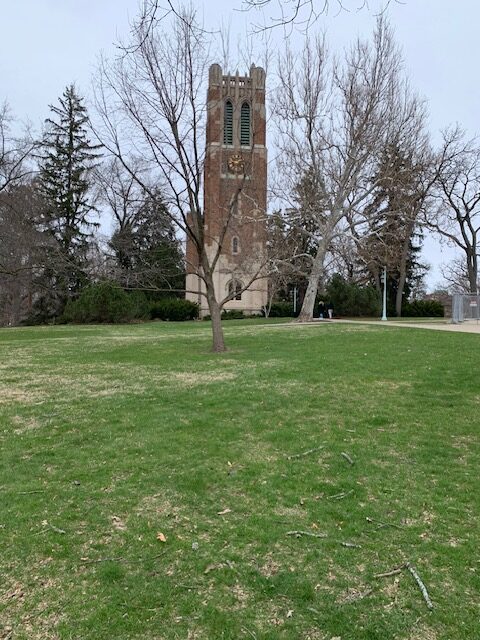In Key Michigan College Town, Students Spill Feelings About Future of America
Much has been written about the growing political and cultural divides between Gen Z men and women across the country. We saw some of these fissures firsthand during our spring visit to Michigan State University, a College Town in the American Communities Project. Females tended to express more deep-seated anxiety about the future of the country than their male peers, as revealed in our 2024 survey with Ipsos.
A few female students had just learned funding for their coveted health, science, or humanities projects was being cancelled by the Trump administration. But the variety of students’ responses to our questions about their hopes and fears for the future underscored the demographic diversity of this community.
Sophia Kunish, a human biology major on the pre-med track at MSU, conveyed her major worries to us: “The two that first come to mind … I heard that Trump is trying to change the constitution so that way he can run for a third term. And that’s very concerning to me. This country was originally founded because our founding fathers really hated that we were under a monarchy, and this, to me, just seems like we’re going back to another monarchy just wrapped up in a pretty package. Another thing that I’m really concerned about is the purchasing power of the U.S…. The burden of a tariff is ultimately borne by the consumer at the end of the day, because businesses will have to raise their prices, and then we have to pay those higher prices.”
Kunish was also thinking about how this may affect her personal trajectory. “I want to go to medical school. The average medical student graduates with a quarter of a million dollars in debt already, and with those added tariffs, it really does concern me, how I’m going to be able to afford that and all the debt I’ll have to be able to take on.”
In this College Town, economic concerns are front of mind. The median household income is nearly $20,000 below the national median of $80,610, according to the U.S. Census. While the uninsured rate is low considering that young people can stay on their parents’ health insurance until age 26, food insecurity and subpar housing are ongoing challenges.
For his part, Lucas Faulker, a first-year games and interactive media major, expressed concern based on his first-generation American background: “The way that the U.S. is going right now is definitely very scary for me. My family is from Germany, my mom is from Germany, so I grew up with learning a lot about what authoritarian governments and fascist governments kind of look like, and I see the direction this country is going in, and it scares me, and I know it scares a lot of other people….”
Yet Faulker’s peers are staying civically engaged — and this gives him hope. “I am optimistic, though, because I see a lot of people in my generation, even people who are my close friends, who are committed to making a change through government, through making their voices heard, through protests, through creating communities and spaces….”
World-awareness infused with optimism continually shone through in responses. As Tristan Clips, a junior finance major with a minor in wealth management, noted: “I’ve been nervous based on recent stuff I’ve been researching…. I think we’ll bounce back, like the housing crash of 2008, we always bounce back. Great Depression, we bounce back. So, I think overall, yeah, we will bounce back because of past trends.”

